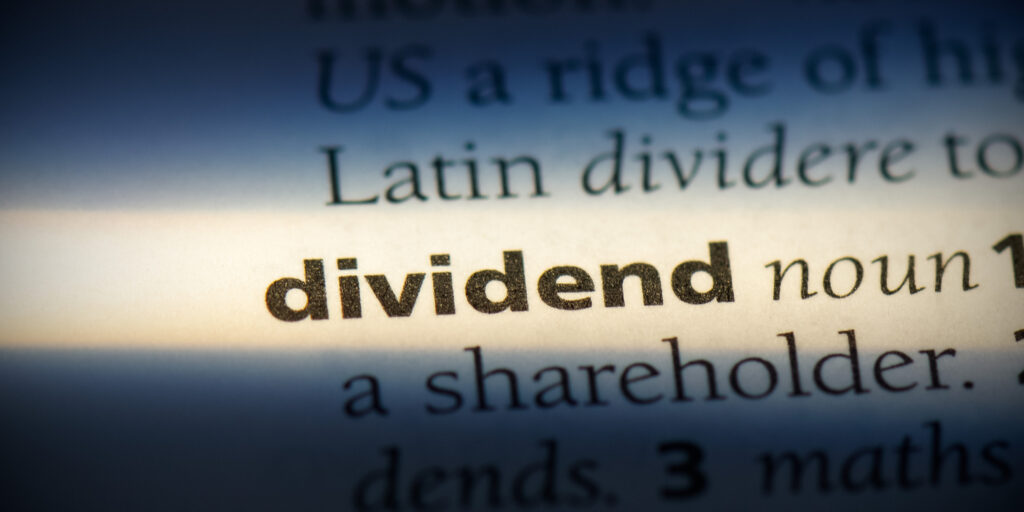A dividend is a portion of profits that a company limited by shares pays to a shareholder (member) as a reward for their investment in the business. The amount of money distributed as dividend payments is based on each member’s percentage of shareholdings and how much surplus income the company has available at that time.
How often are dividends paid?
Many companies distribute dividends on a quarterly basis (i.e. every 3 months), but you can choose to pay yourself dividends whenever the company has available profits.
This could be on a monthly basis, twice per year, once a year, or simply on an ad hoc basis whenever surplus income is available.
How are dividend payments calculated?
It is common for dividend payments to fluctuate, whether they’re paid at regular intervals or only once per year. This is because they are calculated in accordance with the amount of profit available and each member’s shareholdings in the company.
The quantity and value of shares held by each shareholder represent how much of the company they ‘own’ and, therefore, what percentage of profits they can receive as dividends.
Example:
- A company is set up with two shareholders
- The company issues 10 ordinary shares of equal value, so each share represents 10% of the company
- Shareholder A takes 6 shares (60% of the company), and shareholder B takes 4 shares (40% of the company)
- The company has available profits of £2,000
- Shareholder A is entitled to a dividend payment of £1,200 (60% of £2,000)
- Shareholder B is entitled to a dividend payment of £800 (40% of £2,000)
Do all shareholders receive dividends?
Most shareholders in private limited companies receive dividends, but only if dividend rights are attached to their shares.
Some companies issue different classes (types) of shares that do not carry such rights (e.g. management shares, alphabet shares), or shares that only pay dividends in certain circumstances (e.g. deferred shares).
- Dividend tax – a complete guide
- Dividends – do all shareholders get them?
- Company shares for startups
Regardless of what types of shares are held, no dividend payments can be made to any shareholders if the company does not have any profits. Issuing dividends in such circumstances is unlawful and can have serious ramifications for company directors.
Are company directors paid dividends?
Company directors are not entitled to dividends by virtue of their directorship. They can only receive dividend payments if they also hold shares in the company.
How much tax will I pay on dividends?
Dividends are paid from post-tax profits. This is the surplus income that’s left over after the company has accounted for all of its taxes, running costs, and other liabilities due to be paid in the tax year.
Dividend income is not distributed or taxed at source through Pay As You Earn (PAYE) like salaries and wages. Instead, shareholders are personally responsible for declaring their dividend income on a Self Assessment tax return and paying tax on dividends at the end of the tax year.
- Dividend tax guide with calculator 2025-26
- Do I need to register for Self Assessment if I run a Ltd company?
- How to register for Self Assessment
The first £500 of dividend income in a year is tax-free. Additionally, no tax is payable on any income that falls within the shareholder’s Personal Allowance (£12,570 for the 2025/26 tax year).
Once a shareholder has used up their annual Personal Allowance and £500 dividend allowance, their dividend income will be subject to dividend tax rates of 8.75%, 33.75%, and 39.35%.
These rates are based on Income Tax bands, so the amount of tax paid on dividend income will depend on the individual’s total annual earnings.
Please note that the information provided in this article is for general informational purposes only and does not constitute legal, tax, or professional advice. While our aim is that the content is accurate and up to date, it should not be relied upon as a substitute for tailored advice from qualified professionals. We strongly recommend that you seek independent legal and tax advice specific to your circumstances before acting on any information contained in this article. We accept no responsibility or liability for any loss or damage that may result from your reliance on the information provided in this article. Use of the information contained in this article is entirely at your own risk.








Join The Discussion